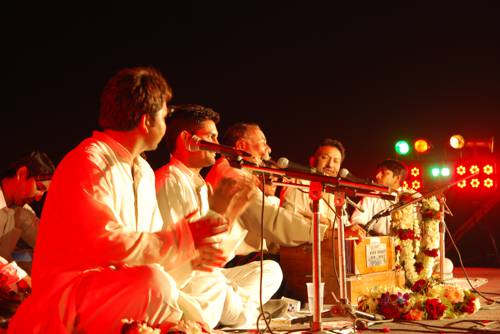
FAQ About Emergence of Sufism in Modern Music

What is Sufism and how does it relate to music?
Sufism is a mystical branch of Islam that emphasizes the inward search for God and shuns materialism. It often uses music, poetry, and dance as spiritual practices to enter into a state of deep meditation and closeness to the divine, a practice known as Dhikr. The music often features devotional chanting and is intended to facilitate a spiritual connection.

How has Sufism influenced modern music genres?
Sufism has influenced modern music by inspiring a range of artists to incorporate spiritual and philosophical elements into their music. It transcends traditional cultural and religious boundaries, influencing genres like pop, rock, and electronic, as well as promoting the fusion of different musical traditions. Artists often use Sufi poetry and themes to add layers of spiritual depth and meaning to their music.

Who are some contemporary artists influenced by Sufism?
Contemporary artists influenced by Sufism include internationally acclaimed musicians like Nusrat Fateh Ali Khan, Abida Parveen, and A. R. Rahman. In the Western music scene, artists such as Madonna and bands like U2 have explored Sufi themes in their work, reflecting on the spiritual and mystical elements in their music.

What are common themes found in Sufi-influenced music?
Common themes in Sufi-influenced music include love (often in a divine context), longing, unity with the divine, and the journey towards spiritual enlightenment. Also, the poetry often explores metaphysical questions and seeks to transcend the material world, aiming for a higher connection with the divine.

Can non-Muslim artists be influenced by Sufism?
Yes, non-Muslim artists can and have been influenced by Sufism. The universal themes of love, peace, and spiritual enlightenment resonate across different cultural and religious backgrounds, allowing artists from various traditions to incorporate Sufi elements into their music to convey deeper spiritual messages and connect with wider audiences.

How are Sufi music performances typically structured?
Sufi music performances often involve a combination of vocal music, instrumental accompaniment, and sometimes dance. The music typically includes repetitive chants and melodies, seeking to achieve a trance-like state known as wajd, where the performers and audience feel an intimate connection with the divine. Instruments commonly used include the tabla, sitar, and harmonium, among others.

What is the significance of Qawwali in Sufi music?
Qawwali is a form of devotional singing that is specific to the Sufi tradition in South Asia. It plays a significant role in Sufi music, aiming to induce a spiritual state within both the performers and the audience. Known for its energetic and passionate expression, Qawwali features a lead singer, a chorus, and a harmonic ensemble, often lasting for many hours.

How does Sufi music help in spiritual practices?
Sufi music aids spiritual practices by providing a medium through which individuals can focus their minds and hearts on the divine. The repetitive rhythms and evocative lyrics help create an environment that facilitates deep meditation and contemplation, allowing practitioners to feel a closer connection to God and experience spiritual ecstasy.

Is Sufi music popular outside the Muslim world?
Yes, Sufi music has gained popularity outside the Muslim world, appealing to audiences globally due to its spiritual depth and universal messages of love and peace. Many Western artists have integrated Sufi elements into their music, helping to bridge cultural divides and introduce the philosophy and mystique of Sufi traditions to broader audiences.

What is the role of poetry in Sufi music?
Poetry plays a central role in Sufi music, serving as the lyrical foundation that conveys spiritual and metaphysical themes. Renowned Sufi poets like Rumi and Hafiz have inspired countless compositions, with their poems exploring universal themes of love, knowledge, and divine connection. The poetry is often recited or sung to evoke emotional and spiritual reactions.

Are there any festivals dedicated to Sufi music?
Yes, there are several festivals dedicated to Sufi music around the world. One of the most famous is the World Sacred Spirit Festival held in India, which attracts musicians and audiences globally to celebrate Sufi music and its spiritual essence. These festivals provide a platform for traditional and contemporary Sufi music performances, promoting cross-cultural dialogues and understanding.

How does Sufi music differ from traditional Islamic music?
While both Sufi and traditional Islamic music share religious themes, Sufi music often places a greater emphasis on personal and mystical experiences with the divine. It tends to be more improvisational and expressive, aiming to induce altered states of consciousness among listeners through its repetitive rhythmic patterns and spiritual lyrics, whereas traditional Islamic music might focus more on formal recitations of religious texts and prayers.

What instruments are commonly used in Sufi music?
Sufi music features a wide variety of instruments, which can vary depending on the region. Common instruments include the tabla, harmonium, sitar, tambourine, and various percussion instruments. The use of these instruments can evoke different spiritual emotions, enhancing the devotional experience of Sufi music.

How do modern artists incorporate Sufi elements into their music?
Modern artists incorporate Sufi elements into their music by integrating Sufi poetry, themes, and musical styles into their compositions. They might draw on the spiritual themes of unity and love, use traditional Sufi instruments, or blend Sufi chants with contemporary rhythms and melodies, creating innovative and cross-cultural musical pieces that resonate with audiences worldwide.

Is there a connection between Sufi music and dance?
Yes, there is a significant connection between Sufi music and dance, notably through the practice of the Whirling Dervishes. This dance involves spinning in repeated circles, symbolizing a spiritual journey in which one seeks to transcend the physical world and connect with the divine. The accompanying music provides the rhythm and atmosphere for this meditative and contemplative practice.

What impact has Sufi music had on Western music culture?
Sufi music has influenced Western music culture by introducing mystical and spiritual elements that have inspired many musicians. It has contributed to the broader appreciation and integration of non-Western musical traditions, fostered cultural exchanges, and enhanced the global music scene's diversity by prompting artists to explore spirituality and existential themes in their art.

Are there modern fusion genres that incorporate Sufi music?
Yes, there are several modern fusion genres that incorporate elements of Sufi music. Musicians often blend Sufi music with jazz, rock, and electronic styles, creating unique soundscapes that bridge different musical cultures and traditions. This fusion movement not only preserves the essence of Sufi music but also modernizes it to appeal to contemporary audiences.

How do live performances of Sufi music differ from recorded sessions?
Live performances of Sufi music often provide a more immersive and emotionally engaging experience compared to recorded sessions. The interactive and communal environment of live performances allows audiences to participate in the spiritual aspects of the music, such as group chanting and ritualistic practices, creating an atmosphere of shared spiritual connection that is harder to replicate in recordings.

What challenges do Sufi musicians face in the modern music industry?
Sufi musicians face several challenges in the modern music industry, including the commercialization of music that may dilute the spiritual and cultural essence of their work. Additionally, there may be cultural and religious sensitivities to navigate when spreading Sufi music globally. Balancing traditional practices with contemporary appeal while maintaining authenticity is often a concern for Sufi artists.

What is the relationship between Sufi music and meditation?
Sufi music is closely related to meditation, as its repetitive rhythms and spiritually profound lyrics facilitate a meditative state. The music allows practitioners to concentrate their thoughts and emotions, leading to deeper introspection and a mystical experience akin to meditation, offering a path to mental tranquility and spiritual insight.
